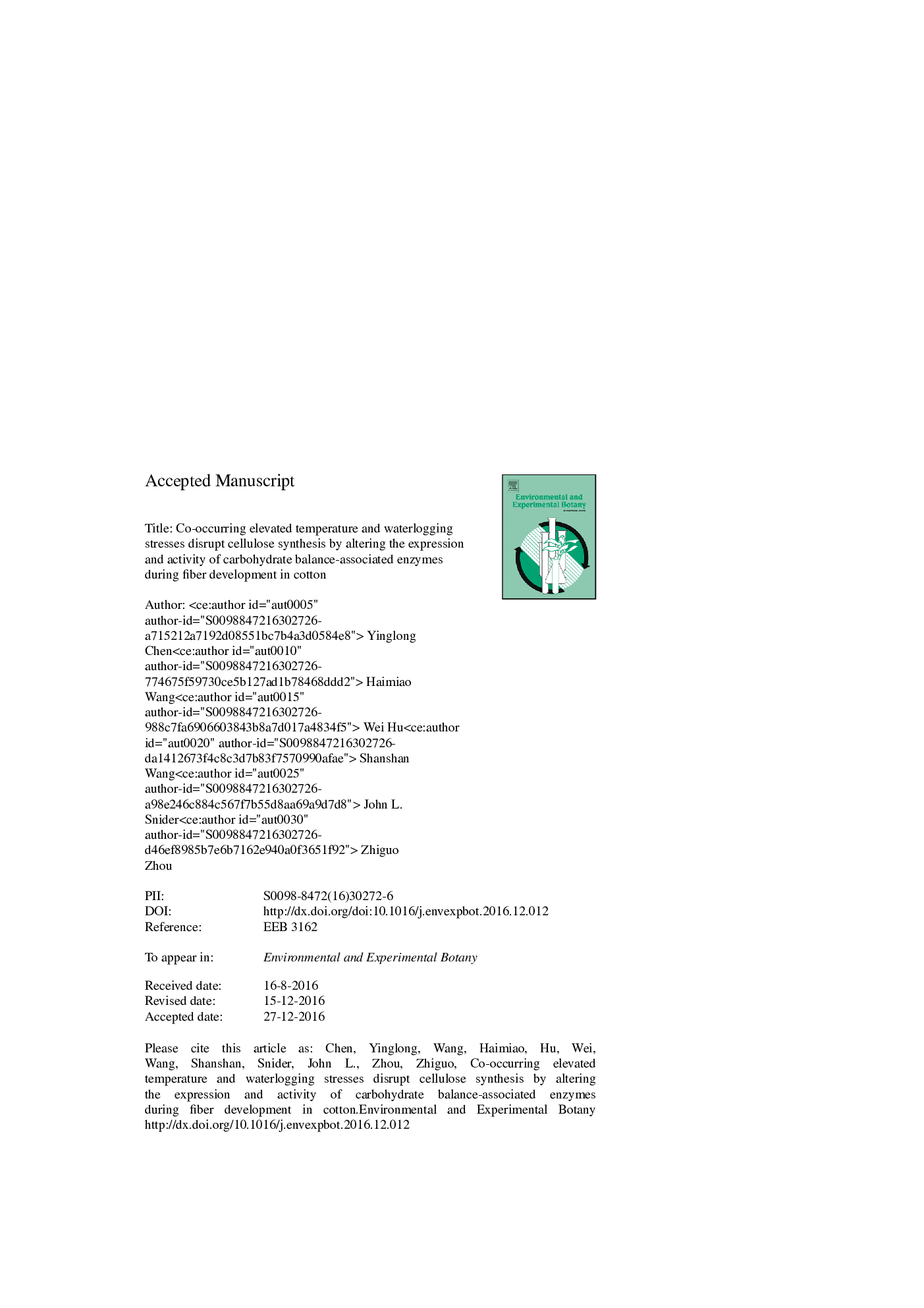| کد مقاله | کد نشریه | سال انتشار | مقاله انگلیسی | نسخه تمام متن |
|---|---|---|---|---|
| 5766692 | 1628042 | 2017 | 35 صفحه PDF | دانلود رایگان |
عنوان انگلیسی مقاله ISI
Co-occurring elevated temperature and waterlogging stresses disrupt cellulose synthesis by altering the expression and activity of carbohydrate balance-associated enzymes during fiber development in cotton
ترجمه فارسی عنوان
همپوشانی با شدت بالا و فشارهای آهسته باعث اختلال در سنتز سلولز می شود با تغییر بیان و فعالیت آنزیم های مرتبط با تعادل کربوهیدرات در طول توسعه فیبر در پنبه
دانلود مقاله + سفارش ترجمه
دانلود مقاله ISI انگلیسی
رایگان برای ایرانیان
کلمات کلیدی
DPASPSCALsUDPGINVMDTGossypium hirsutuminvertase - اینورتازElevated temperature - درجه حرارت بالاDays post anthesis - روز بعدSucrose phosphate synthase - سداز فسفات سروزSucrose synthase - سنتاز ساکاروزcallose synthase - سنتاز کولوزcellulose synthesis - سنتز سلولزSuSy - سوزیWaterlogging - غرق شدنSucrose metabolism - متابولیسم ساکاروزfresh weight - وزن ترdry weight - وزن خشک
موضوعات مرتبط
علوم زیستی و بیوفناوری
علوم کشاورزی و بیولوژیک
بوم شناسی، تکامل، رفتار و سامانه شناسی
چکیده انگلیسی
Soil waterlogging events and elevated temperature conditions occur frequently in the Yangtze River Valley, yet the effects of these co-occurring stresses on fiber development have received little attention. In this study, combined elevated temperature (34.1/29.0 °C) and soil waterlogging (3, 6 days) on fiber cellulose synthesis was investigated during flowering and boll development. The coupling of elevated temperature (ET) and soil waterlogging (SW) more negatively impacted final cellulose content (reduced by 9.5-27.5%) than either stress individually, and the effect of SW alone was greater than ET alone (34.1/29.0 °C). Treatment of ET alone mainly limited cellulose synthesis by decreasing activities of sucrose degrading enzymes, especially sucrose synthase. The combination of ET and SW disrupted deposition of sucrose and cellulose but increased the callose content of developing fibers. Increased sucrose synthase (SuSy) activity was the dominant factor influencing sucrose degradation in the fiber under the combination of ET and SW. Both sucrose phosphate synthase (SPS) and acid/alkaline Invertase activities were decreased under combined stresses of ET and SW and SPS was the most sensitive to the aforementioned stresses. GhSuSy-A and GhSPS-1 were the key gene isoforms closely associated with fiber sucrose metabolism under combined stresses. Co-occurring elevated temperature and waterlogging stresses highly up-regulated GhCalS-5 and β-1,3-glucanase expression levels, which led to increased fiber callose content. Thus, we concluded that concomitant exposure to elevated temperature and waterlogging limited cellulose synthesis not only by lowering sucrose metabolism enzyme activities but also by favoring the conversion of UDPG to callose rather than cellulose.
ناشر
Database: Elsevier - ScienceDirect (ساینس دایرکت)
Journal: Environmental and Experimental Botany - Volume 135, March 2017, Pages 106-117
Journal: Environmental and Experimental Botany - Volume 135, March 2017, Pages 106-117
نویسندگان
Yinglong Chen, Haimiao Wang, Wei Hu, Shanshan Wang, John L. Snider, Zhiguo Zhou,
